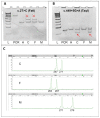Meier-Gorlin Syndrome: Clinical Misdiagnosis, Genetic Testing and Functional Analysis of ORC6 Mutations and the Development of a Prenatal Test
- PMID: 36012502
- PMCID: PMC9408996
- DOI: 10.3390/ijms23169234
Meier-Gorlin Syndrome: Clinical Misdiagnosis, Genetic Testing and Functional Analysis of ORC6 Mutations and the Development of a Prenatal Test
Abstract
Meier−Gorlin syndrome (MGS) is a rare genetic developmental disorder that causes primordial proportional dwarfism, microtia, the absence of or hypoplastic patellae and other skeletal anomalies. Skeletal symptoms overlapping with other syndromes make MGS difficult to diagnose clinically. We describe a 3-year-old boy with short stature, recurrent respiratory infections, short-rib dysplasia, tower head and facial dysmorphisms who was admitted to the Tomsk Genetic Clinic to verify a clinical diagnosis of Jeune syndrome. Clinical exome sequencing revealed two variants (compound heterozygosity) in the ORC6 gene: c.2T>C(p.Met1Thr) and c.449+5G>A. In silico analysis showed the pathogenicity of these two mutations and predicted a decrease in donor splicing site strength for c.449+5G>A. An in vitro minigene assay indicated that variant c.449+5G>A causes complete skipping of exon 4 in the ORC6 gene. The parents requested urgent prenatal testing for MGS for the next pregnancy, but it ended in a miscarriage. Our results may help prevent MGS misdiagnosis in the future. We also performed in silico and functional analyses of ORC6 mutations and developed a restriction fragment length polymorphism and haplotype-based short-tandem-repeat assay for prenatal genetic testing for MGS. These findings should elucidate MGS etiology and improve the quality of genetic counselling for affected families.
Keywords: Jeune syndrome; Meier–Gorlin syndrome; ORC6; exon skipping variant; prenatal genetic testing.
Conflict of interest statement
The authors declare no conflict of interest.
Figures




Similar articles
-
Drosophila model of Meier-Gorlin syndrome based on the mutation in a conserved C-Terminal domain of Orc6.Am J Med Genet A. 2015 Nov;167A(11):2533-40. doi: 10.1002/ajmg.a.37214. Epub 2015 Jul 2. Am J Med Genet A. 2015. PMID: 26139588 Free PMC article.
-
Humanized Drosophila Model of the Meier-Gorlin Syndrome Reveals Conserved and Divergent Features of the Orc6 Protein.Genetics. 2020 Dec;216(4):995-1007. doi: 10.1534/genetics.120.303698. Epub 2020 Oct 9. Genetics. 2020. PMID: 33037049 Free PMC article.
-
Further insight into the phenotype associated with a mutation in the ORC6 gene, causing Meier-Gorlin syndrome 3.Am J Med Genet A. 2015 Mar;167A(3):607-11. doi: 10.1002/ajmg.a.36906. Am J Med Genet A. 2015. PMID: 25691413
-
Meier-Gorlin syndrome.Orphanet J Rare Dis. 2015 Sep 17;10:114. doi: 10.1186/s13023-015-0322-x. Orphanet J Rare Dis. 2015. PMID: 26381604 Free PMC article. Review.
-
Further delineation of CDC45-related Meier-Gorlin syndrome with craniosynostosis and review of literature.Eur J Med Genet. 2020 Feb;63(2):103652. doi: 10.1016/j.ejmg.2019.04.009. Epub 2019 Apr 13. Eur J Med Genet. 2020. PMID: 30986546 Review.
Cited by
-
Loss-of-function of zebrafish cdt1 causes retarded body growth and underdeveloped gonads resembling human Meier-Gorlin syndrome.J Zhejiang Univ Sci B. 2023 Nov 15;24(11):1037-1046. doi: 10.1631/jzus.B2300195. J Zhejiang Univ Sci B. 2023. PMID: 37961805 Free PMC article.
-
The expanding genetic and clinical landscape associated with Meier-Gorlin syndrome.Eur J Hum Genet. 2023 Aug;31(8):859-868. doi: 10.1038/s41431-023-01359-z. Epub 2023 Apr 14. Eur J Hum Genet. 2023. PMID: 37059840 Free PMC article. Review.
References
-
- de Munnik S.A., Bicknell L.S., Aftimos S., Al-Aama J.Y., van Bever Y., Bober M.B., Clayton-Smith J., Edrees A.Y., Feingold M., Fryer A., et al. Meier-Gorlin syndrome genotype-phenotype studies: 35 individuals with pre-replication complex gene mutations and 10 without molecular diagnosis. Eur. J. Hum. Genet. 2012;20:598–606. doi: 10.1038/ejhg.2011.269. - DOI - PMC - PubMed
Publication types
MeSH terms
Substances
Supplementary concepts
LinkOut - more resources
Full Text Sources
Medical
Miscellaneous

